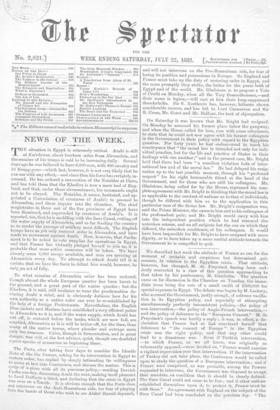On Saturday it was known that Mr. Bright had resigned.
On Monday he assumed his former place below the gangway, and when the House called for him, rose with some reluctance, to state that he could not now agree with his former colleagues in the Government in their policy with regard to the Egyptian question. For forty years he had endeavoured to teach his countrymen that "the moral law is intended not only for indi- vidual practice, but for the life and practice of States in their dealings with one another ;" and in the present case, Mr. Bright bald that there had been "a manifest violation both of inter- national law and of the moral law." He bad delayed his resig- nation up to the last possible moment, through his "profound respect" for his right honourable friend at the head of the Government, and for those who are still his colleagues. Mr. Gladstone, being called for by the House, expressed his com- plete agreement with Mr. Bright in thinking that the moral law is as applicable to the conduct of nations as to that of individuals, though he differed with him as to the application iu this particular case of the divine law. Mr. Bright's resignation was, said the Prime Minister, the cause to him and to his colleagues of the profoundest pain; and Mr. Bright would. carry with him into the independent position which he had resumed the unbroken esteem, and on all subjects but the one on which they differed, the unbroken confidence, of his colleagues. It would have been impossible for Mr. Bright to have resigned with more dignity, or to have taken up a more cordial attitude towards the Government he is compelled to quit.


































